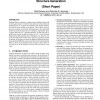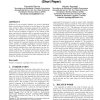ATAL
2008
Springer
14 years 1 months ago
2008
Springer
There is an increasing number of agent-oriented programming languages that have working interpreters and platforms, with significant progress in the quality of such platforms over...
ATAL
2008
Springer
14 years 1 months ago
2008
Springer
Forming effective coalitions is a major research challenge in the field of multi-agent systems. Central to this endeavour is the problem of partitioning the set of agents into exh...
ATAL
2008
Springer
14 years 1 months ago
2008
Springer
In this paper we study tools for conviviality to develop user-friendly multiagent systems. First, we show how to use the social-cognitive concept of conviviality in multiagent sys...
ATAL
2008
Springer
14 years 1 months ago
2008
Springer
This paper presents an experiment that evaluates and compares the user enjoyment when playing a game of chess in two situations: against a physically embodied robotic agent and ag...
ATAL
2008
Springer
14 years 1 months ago
2008
Springer
ATAL
2008
Springer
14 years 1 months ago
2008
Springer
As virtual characters become more autonomous, their use in interactive drama is growing. By creating interesting and well authored personalities, these characters are able to inte...
ATAL
2008
Springer
14 years 1 months ago
2008
Springer
We present a logic for reasoning about properties of agent programs under different agent execution strategies. Using the agent programming language SimpleAPL as an example, we sh...
ATAL
2008
Springer
14 years 1 months ago
2008
Springer
Most current crowd simulators animate homogeneous crowds, but include underlying parameters that can be tuned to create variations within the crowd. These parameters, however, are...
ATAL
2008
Springer
14 years 1 months ago
2008
Springer
Behaviors in soccer-agent domains can involve individual plays, several players involved in tactical plays or the whole team trying to follow strategies supported by specific form...
ATAL
2008
Springer
14 years 1 months ago
2008
Springer
This research explores productive multi-player games as a platform for human-computer agent collaboration. A multiagent perspective is taken to examine the principles of both game...


